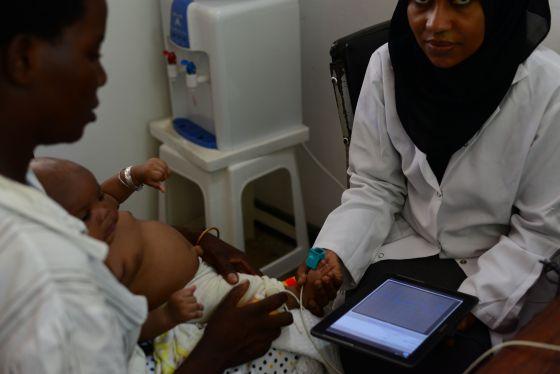Electronic algorithms based on host biomarkers Point of Care Tests to decide on admission and antibiotic prescription in Tanzanian febrile children (e-POCT)
This project addresses the challenge of overprescription of antibiotics. It develops decision charts for the management of febrile illness wich include i) few clinical parameters simple to assess, and ii) POCTs results based on specific host markers that can discriminate between mild and severe disease and unspecified fevers of bacterial and of viral origin.
About the project
Background
Health professionals in developing countries have limited ability to identify children at risk of dying and those in need of antibiotics. The main reasons are limited clinical skills and time, unavailability of diagnostic tests (laboratory or x-ray) and non-adherence to practice guidelines. Child mortality is therefore higher than it should be. Etiological diagnostic tests (detecting microorganisms) may not always help since the distinction between infection and disease and between mild or severe disease is not straightforward. Over-prescription of antibiotics is therefore widespread and leads to the development of drug resistance.
Objectives
To address these challenges, decision charts for the management of febrile illness will be developed and include i) few simple to assess clinical parameters, and ii) Point of Care Test (POCT) results based on specific host markers that can discriminate between mild and severe disease, pneumonia and upper respiratory tract infections, and unspecific fevers of bacterial and of viral origin. This algorithm combining clinical and bedside laboratory tests will be built on an electronic support (android tablet). The first objective of the study is to assess the safety of new electronic decision trees that integrate simple clinical assessment and POCT results (oxygen saturation and a combination of specific biomarkers of inflammation) as a triage tool to decide on admitting febrile children; the second objective is to assess the usefulness and safety of new electronic decision trees that integrate simple clinical assessment and POCT results (a combination of specific biomarkers of inflammation) as decision-making tool to prescribe antibiotics to non-severe febrile children.
Relevance
The development of such a tool will hopefully decrease mortality due to delayed admission. At the same time, it will decrease irrational use of antibiotics, and hence emergence of drug resistance, which represents one of the most important public health threats our world is facing today. This project has the potential of huge applicability since it is specifically designed for end-users with limited medical skills and low resources, as is the case in most areas of developing countries.
Geographic scope
- Tanza nia
Project information on P3
- Link to project on SNSF research database P3

